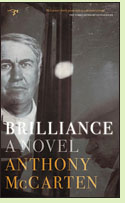Brilliance
by Anthony McCarten
Reviewed by Margaret Donsbach

Thomas Alva Edison, the subject of Brilliance, presided over a workshop that produced hundreds of inventions patented in his name, perhaps most iconically the electric lightbulb. His life has become a sort of Rorschach test for novelists and historians. Was he the benign and brilliant "Wizard of Menlo Park"? A cheat who underpaid his employees and claimed their inventions as his own? A cut-throat competitor who would use any means to drive his rivals out of business?
Brilliance is a short, intense novel portraying a man drowning in moral quandaries. Edison is restless, short-tempered, idealistic, self-centered. Strong-willed in pursuing the success of his inventions, he is weak-willed when facing pressure to compromise his values in that pursuit. The story keeps a tight focus on Edison's relationship with banking plutocrat J.P. Morgan, whose seemingly infinite supply of money and scant supply of patience goaded Edison to set aside one scruple after another. In the attempt to demonstrate that direct electrical current, pioneered by Edison, was safer than the alternating current promoted by George Westinghouse, Edison's commitment to nonviolence wavered, and he ordered lab workers to electrocute stray dogs and develop an electric chair, run on alternating current, as a means of capital punishment.
Is Morgan, his grotesquely swollen nose a metaphor for a diseased conscience, villain enough to excuse Edison's fall from grace? Does the novel end on a note of forgiveness for the elderly, soul-sick Edison, reluctant to face a tribute honoring him for electric light and the economic boom that accompanied it? Or are the crowds who cheer for him in August of 1929 a deep irony that lets no one off the hook - least of all the readers consuming electricity more profligately than ever in a world despoiled by our hunger for energy? (2013, 213 pages)
More about Brilliance at Powell's Books or Amazon.comOther novels in which Edison appears:
The Invention of Everything Else by Samantha Hunt (2008), about Nicola Tesla, who was employed by Edison shortly after he immigrated to America. More info
The Edge of Ruin by Irene Fleming (2010), a humorous mystery about a woman whose husband recklessly decides to become a movie producer in 1909, flouting Thomas Edison's ruthless determination to dominate the film industry; #1 in the Emily Weiss mystery series. See review or more info at Amazon.com
Five Fists of Science by Matt Fraction and Steven Sanders (2006), a graphic novel in which Edison features as one of the evil villains. More info
Nonfiction about Edison and electric light:
The Age of Edison: Electric Light and the Invention of Modern America by Ernest Freeberg (2013). More info
The Wizard of Menlo Park by Randall Stross (2007). More info
Edison: A Life of Invention by Paul Israel (2000). More info
At the Movies:
Edison the Man
Online:
The Thomas Edison Center at Menlo Park, the website of a museum at New Jersey's Edison State Park, located on the site where Edison's laboratory once stood
Back to Novels of Nineteenth-Century America
Back to Directory of Book Reviews